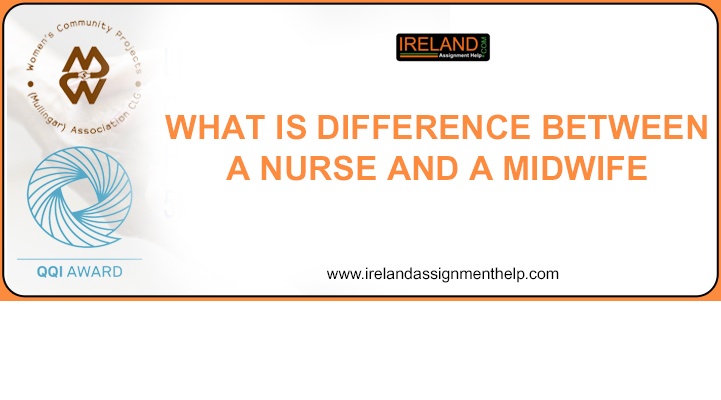What is the Difference Between a Nurse and a Midwife
Midwives and nurses are related to the medical field. Both midwifery and nurse courses are offered at colleges and universities in Ireland. Students in Ireland can do either course and can learn its practices and implications. In this article, we are discussing the difference between the role of nurse and midwife. The difference is cleared and simplified by the experts from Ireland’s assignment help.

Specializations in these mentioned courses are also available for the students. This is discussed later in this article.
Comparison between the role of Nurse and Midwife
| Nurse | Midwife |
| Nurse provides a variety of the medical service to the patients | Midwives do similar work but they are specialized in providing medical help to women with pregnancy. |
| The nurse can take general care of the patients | Midwife treats women with problems with gestation and delivering the baby. |
| The nurse assists other medical professionals with the tests. | A midwife can order tests for their patients and can also diagnose the condition |
| They are not included in any special category. | Midwives are one of the specialties that are included in the category of advanced practice registered nurses. |
| They need their degree or the course certificate to practice. | They need their degree along with a national certificate to practice. |
| Their working hours are comparatively more and the work is demanding and challenging. | Their working hours depend upon the workplace as they also work for on-call requirements when the women go into labour. |
| Nurses usually just check on the patients for progress and visible changes. | Midwives are required to examine the patients with problem symptoms and progress. |
| They help to give medications to the patient | They give the info about disease prevention and prenatal diseases. |
| The nurse prepares the patients to discharge | The midwife assists the physician during the process of cesarean sections. |
| Nurses are required to inform and report the concern to the other medical staff. | Midwives are required to handle emergencies during the delivery. |
| No to minimal role after the delivery. | Take care and monitor the mother and the baby after the delivery. |
| Nurses can specialize in child nursing, sexual health nursing, mental health nursing, etc. | Midwives can specialize in teenage pregnancy, and careening for abnormalities. High-risk pregnancy, etc. |
There are various role and specialization differences between the two. Nurse and Midwives can find themselves working with different staff and departments. While there are many differences between the nursing and midwifery careers there are some similarities too like working at hospitals, emergency wards, etc., and being involved in the medical assistance to the patients.
The students of Ireland have many options to do any course among them. They can still enjoy the student life of the college campus or university campus. They often find themselves with assignment burdens and difficult assignments. All they have to do is pay for the assignment and get it written by an expert from a top assignment writing services company. Nursing and Midwifery courses students in Ireland are seen to be taking writing services and growing in their academics.
Get 100% Unique Assignment Papers for Your College & Get Good Grades
Frequently Asked Questions (FAQs)
1. What education path leads to becoming a certified nurse-midwife
To work as a nurse-midwife, the route isn’t short. First comes a general nursing degree, then registration with the Nursing and Midwifery Board of Ireland. After that, it’s back to university for a higher diploma or a master’s in midwifery. Most of that course is spent on hospital wards catching real cases, not just lectures. Once the hours and exams are done, registration as a midwife is granted, and that’s when full practice rights start.
2. How do clinical responsibilities differ during childbirth
When a woman’s in labour, nurses mostly help with checks, charts, and equipment. Midwives, though, take charge of the delivery itself — from early contractions to after the baby’s out. They decide when to call a doctor, when to intervene, and when to just let nature do its job. In short, nurses support the process; midwives lead it.
3. Which legal scopes of practice separate nurses from midwives
There’s a legal boundary between both roles. Midwives have the right to manage normal pregnancies and deliveries on their own. They can order scans or tests and act without a doctor standing over them. Nurses, by contrast, work under medical direction and don’t have authority to lead births. The Nursing and Midwifery Board of Ireland’s code spells that out clearly — midwives hold autonomous clinical responsibility; nurses assist within the team.
4. How do patient outcomes compare with midwife-led care versus OB-led care
Studies from Irish and UK hospitals keep showing roughly the same pattern. Women under midwife-led care usually face fewer surgical births, fewer epidurals, and less stress overall. Obstetrician-led care comes in when there’s risk or complications — and that’s crucial — but for healthy pregnancies, midwife-led pathways often mean calmer experiences and quicker recovery times. Safety outcomes are near identical either way.
5. What are typical work settings and hours for midwives versus nurses
Midwives spend most of their time in maternity wards, antenatal clinics, or out doing postnatal visits. Hours depend on births, not on the clock. If a woman goes into labour at 2 a.m., they go. Nurses have steadier schedules — hospitals, surgeries, care homes, mental-health units — long shifts for sure, but generally planned in advance. One role’s predictable, the other’s not.
6. Can a midwife be called a nurse
Not really, even though they share roots. Every midwife has nursing skills, but once qualified, the title changes. “Nurse” is the broad umbrella — “midwife” is a specialist branch focused on pregnancy and birth. So, in conversation, it’s fine, but professionally, they’re separate registrations under the same board.
7. Is it harder to be a nurse or a midwife
Depends on what kind of hard you mean. Nursing stretches your stamina; it’s busy, varied, and constant. Midwifery hits harder emotionally — responsibility for two lives at once and unpredictable shifts that never stay calm for long. Both demand focus and empathy. One wears you out physically, the other mentally, but both come with moments that make it worth it.
8. What are the disadvantages of a midwife
The biggest downside is pressure. Shifts run long, calls can come at any hour, and outcomes don’t always go to plan. There’s heavy paperwork, emotional load, and not much chance to fully switch off. Progression into senior roles can take years, too. Still, most midwives stick with it because helping a new life arrive safely feels like something you can’t really measure against the tiredness.
9. Are midwives just nurses with extra training, or totally separate?
In Ireland, midwifery is its own degree, same length as nursing, but all about pregnancy and birth. Nurses cover everyone; midwives focus only on mums and babies.
10. Can someone study nursing and midwifery together?
Not really, no. You pick one route first. Most do General Nursing or Midwifery in places like UCD or Trinity. Some people qualify in one, then later apply for the other, but that means another few years in college.
11. Who can actually deliver a baby here – nurses or midwives?
That’s a midwife’s job. Nurses are brilliant for general care, but the HSE only lets midwives and doctors manage the actual birth. In Holles Street or Cork Maternity, it’s midwives who stay by your side through labour.
12. What’s the real day-to-day difference between the two jobs?
Nurses bounce between loads of areas – A&E, wards, psych, surgery. Midwives? They’re glued to maternity units, antenatal clinics, or homes for postnatal visits. Both care roles but very different kinds of pressure.
13. If I fail a midwifery essay, does it mean I fail the whole year?
No, don’t panic. You only redo the bit you messed up. A mate in my DCU class had to resubmit her antenatal care project – painful but doable. It slows you down but doesn’t wipe your year.
14. Can I pay someone to do my “nurse vs midwife” comparison assignment?
You’ll spot ads all over the place promising ready-made essays, but to be fair, that’s asking for trouble. QQI and Irish universities take plagiarism seriously. Safer route? Get proper guidance or editing help from Ireland Assignment Help — they’ll show you how to plan and structure it so it’s still your own voice. You learn, stay within rules, and end up with something genuine.
15. Who has tougher hours – nurses or midwives?
Both, honestly. Nurses work long, draining shifts across hospitals. Midwives? Totally unpredictable ‘cause babies arrive whenever.
16. Do nurses or midwives earn more money in Ireland?
They’re nearly the same starting off ‘cause both sit on the HSE pay scale. Over time, it depends – midwives might get extra for on-call nights, nurses might climb into specialist roles or management with better pay.
17. Are lecturers actually checking for AI in essays?
Oh, absolutely. Every college uses Turnitin’s AI detection now, and they’re sharper about it than ever. A few students even lost marks ‘cause their essays read too stiff, like a chatbot wrote them. That’s why many go for AI-Free Assignment Help in Ireland — real Irish writers reword and humanise drafts so they sound natural, not robotic. It keeps essays safe, personal, and fully compliant.


